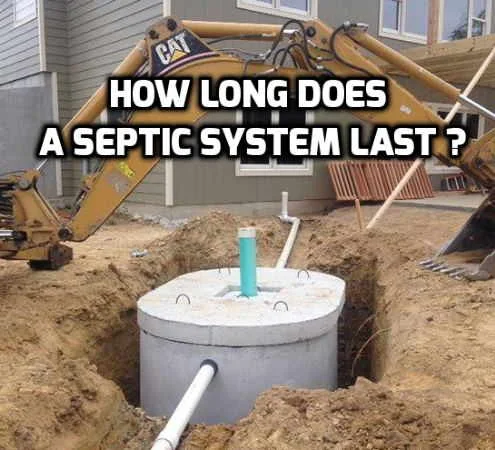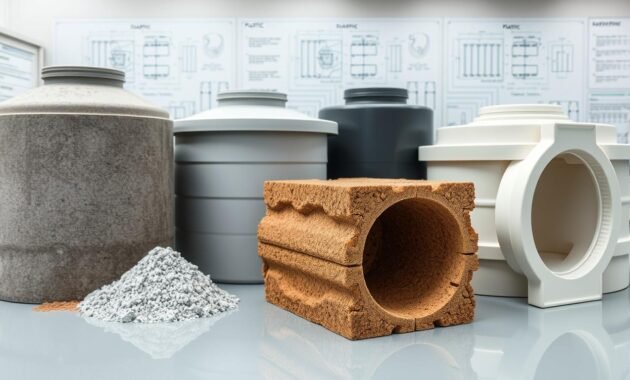Many homeowners wonder how long their septic system will last. My research shows that a typical septic system can last from 15 to 40 years. But, this time frame can vary based on several important factors.
The life of your septic system isn’t just a matter of chance. It’s about knowing the possible issues before they cause big problems. This knowledge can help you avoid expensive repairs and protect the environment.
Ignoring your septic system can lead to early failure. This can result in costly repairs and harm the environment. The materials used, soil conditions, water table, and how well you maintain it all play a big role. I’ll guide you through these key points to help your septic system last longer.

Understanding Septic System Basics
Knowing how septic tanks work can save you a lot of money. Almost 1 in 5 homes in the U.S. use septic systems. This is important for people living in rural or suburban areas.
A typical septic system is a complex network underground. It treats wastewater from toilets, showers, sinks, and washing machines. These systems handle wastewater safely where there’s no central sewer system.
Components of a Septic System
The main parts of a septic system are:
- Main drainage pipe
- Septic tank
- Distribution box
- Drainfield
How Septic Systems Process Waste
Septic tanks separate wastewater into three layers. Solid waste settles at the bottom, and oils and lighter materials float on top. The middle layer, which is relatively clear, is filtered through the drainfield into the soil.
Read also: How Much Concrete Septic Tank Cost
Different Types of Septic Systems
Septic systems vary based on soil, household size, and environmental rules. Some common types are:
| System Type | Best Suited For | Typical Lifespan |
|---|---|---|
| Conventional System | Homes with good soil drainage | 20-30 years |
| Aerobic Treatment Unit | Areas with poor soil conditions | 15-25 years |
| Mound System | High water table locations | 20-30 years |
Knowing your septic system’s basics helps you take care of it. This can extend its life by 5-10 years with regular maintenance and inspections.
How Long Does a Septic System Last
Knowing how long a septic system lasts is key for homeowners. Most systems can go from 20 to 40 years with the right care. The exact time depends on several important factors.
Different materials affect how long a septic system lasts. Here’s a quick look at typical lifespans:
- Concrete septic tanks: Up to 40 years
- Steel septic tanks: 15-30 years
- Plastic septic tanks: Over 40 years with proper maintenance
Read also: 500 Gallon Plastic Septic Tank
Several things can greatly affect your septic system’s life:
- Maintenance frequency
- Soil conditions
- Water usage patterns
- Installation quality
- Environmental factors
Regular maintenance is vital to extend your septic system’s life. Experts say to pump your tank every 3-5 years and do routine checks. Skipping these steps can shorten your system’s life and lead to expensive fixes or a new system.
Watch for signs of trouble, like slow drains, bad smells, or soggy spots in your yard. Catching problems early can prevent big issues.
Impact of Construction Materials on Lifespan
The material used in a septic system greatly affects its lifespan. Different materials have different levels of performance and lifespan. This directly impacts the system’s reliability over time.

Homeowners have several options for septic tank materials. Each material has unique characteristics that affect the system’s performance and lifespan.
Steel Septic Tanks: Limited Durability
Steel septic tanks are the shortest-lived option. They usually last 15-20 years because of rust and corrosion. Environmental factors make them deteriorate faster, making them less desirable for long-term use.
Concrete Septic Tanks: Long-Term Investment
Concrete septic tanks are the most durable choice. A well-maintained concrete tank can last over 40 years. They are strong and resist environmental pressures, making them a reliable long-term investment.
| Material | Average Lifespan | Key Characteristics |
|---|---|---|
| Steel | 15-20 years | Prone to rust, shortest lifespan |
| Concrete | 40+ years | Highly durable, resistant to environmental stress |
| PVC/Plastic | 20-30 years | Lightweight, moderate durability |
Modern Materials: PVC and Alternatives
New materials like PVC are becoming popular in septic systems. They last 20-30 years and are lightweight. This makes them easier to install than traditional materials.
- Steel septic tanks require more frequent replacement
- Concrete septic tanks offer maximum longevity
- PVC tanks provide a balanced middle-ground solution
Choosing the right material depends on budget, local conditions, and maintenance plans. Talking to septic system experts can help homeowners make the best choice for their needs.
Soil Conditions and System Longevity
Your septic system’s life depends on the soil around it. Different soils affect how well it works and how long it lasts. Knowing about these conditions helps protect your investment and avoid expensive fixes.
Soil type is key to how long your septic system lasts. The right soil can make it last longer, while the wrong one can shorten its life. Here are the main factors that affect septic system performance:
- Soil pH levels directly impact system durability
- Clay soils can restrict drainage and reduce system efficiency
- Sandy soils promote better water percolation
- Neutral or slightly alkaline soils support longer septic system life
Acidic soil is bad for septic systems. It can corrode metal parts faster, shortening the life of steel tanks and pipes. Concrete tanks, on the other hand, can last 40 years or more in acidic soil.
The rate at which your soil drains is also important. Slow-draining soils can cause backups, while fast-draining soils might not filter waste well. Getting your soil tested by a professional can reveal specific challenges for your septic system.
Homeowners can take steps to protect their septic system by:
- Conducting regular soil tests
- Maintaining proper drainage around the system
- Avoiding compaction of soil near the septic tank
- Managing vegetation to prevent root intrusion
By managing soil conditions, you can extend your septic system’s life and avoid expensive replacements.
The Role of Water Table in System Performance
Knowing how the water table affects your septic system is key to keeping it working well. The water table is the level where groundwater fills the soil. Its height can greatly affect your septic system’s performance and how long it lasts.

When the water table goes up, it can cause big problems for your septic system. High water levels can make it hard for the system to handle and clean wastewater properly.
High Water Table Impacts
A high water table can lead to several issues for septic systems:
- Potential system waterlogging
- Slow drainage issues
- Improper toilet flushing
- Basement floor drain backups
- Risk of septic tank flooding
Drainage Considerations
Good drainage is vital when dealing with high water tables. Your septic system’s drainfield needs enough space to handle wastewater without being flooded by groundwater.
Flood Plain Concerns
Homeowners in flood-prone areas need to take extra steps. I suggest getting a professional check to make sure your septic system can handle water table changes. Regular checks can spot and fix problems early.
To prevent issues, make sure roof gutters and sump pump water don’t flow towards your septic system. Also, keep the soil around your drainage area in good condition.
Usage Patterns and System Durability
Your household’s daily activities greatly affect septic tanks’ life. The waste you put into the system can change its lifespan and how well it works.
Knowing how your actions impact septic systems is important. Some habits can make septic tanks last longer, while others can shorten their life.
- Household size directly influences system load
- Water conservation practices impact system performance
- Certain household products can damage septic systems
Big families or homes with lots of guests stress septic systems more. Every flush, shower, and laundry cycle wears it down. Too much stress can make the system fail early, cutting its life from 20-40 years to much less.
Being mindful of how you use your septic system is key. This means:
- Limiting water use
- Avoiding harmful chemical cleaners
- Spreading out water-intensive activities
- Being careful about what goes down drains
By changing your household’s habits, you can keep your septic system working well. Regular care and smart practices can prevent expensive fixes and early replacement.
Essential Maintenance for Extended Lifespan
Keeping your septic system in good shape is key to its long life and avoiding big repair bills. A well-maintained septic tank can last up to 40 years. But, ignoring it can cut its lifespan and performance.
Regular upkeep includes several important steps to keep your septic system healthy and working right. I suggest a proactive plan to make sure your system lasts for many years.
- Schedule professional inspections every 3-5 years
- Pump the septic tank regularly to remove accumulated solids
- Monitor water usage and implement conservation strategies
- Protect the drain field from possible damage
- Avoid flushing non-biodegradable materials
Knowing what your septic system needs can stop it from failing early. Different septic tanks need different care, but some basic rules apply to all.
| Maintenance Task | Frequency | Purpose |
|---|---|---|
| Professional Inspection | Every 3-5 years | Detect possible problems early |
| Tank Pumping | Every 3-5 years | Clear out built-up solids |
| Water Conservation | Continuous | Lessen system stress |
| Drain Field Protection | Ongoing | Stop soil compaction |
By spending time and money on the right septic tank care, you can greatly extend its life and avoid costly fixes. Always remember, it’s cheaper to prevent problems than to fix them later.
Signs of Aging Septic Systems
Spotting early signs of an aging septic system can save you a lot of money. As a homeowner, I’ve learned that your septic system gives clear signals when it’s nearing the end. These signs can help you avoid expensive repairs.
Here are key signs that your septic system might be failing:
- Slow drains throughout your home
- Gurgling sounds in pipes and toilets
- Unpleasant sewage odors near drains or in the yard
- Unusually lush or wet vegetation over the drainfield
- Standing water or soggy areas around the septic tank
A septic system usually lasts between 15 to 40 years. Certain signs suggest it’s nearing the end. Look out for persistent drainage problems, frequent backups, or wet spots in your yard. These often mean your system is struggling to handle wastewater.
Homeowners should watch for these signs. About 30% of homeowners don’t notice important septic system failure signs. Regular checks can spot problems early, possibly extending your system’s life and saving you money.
If you see several warning signs, it’s time to call a septic system expert. They can tell if your system needs fixing or a full replacement. This helps you make smart choices about managing your home’s wastewater.
Conclusion
Knowing how long a septic system lasts is key for homeowners. A well-cared-for septic system can last 20 to 40 years. Some even last longer with the right care.
Many things affect how well your septic system works. This includes the type of tank, the soil, and how much you use it. Concrete and plastic tanks can last up to 40 years. Steel tanks usually last 15-20 years.
Regular maintenance is important. Pumping your septic every 3-5 years and checking it often can help it last longer.
Thinking about the cost is also important. Replacing a septic system can cost a lot, from $3,000 for a tank to over $15,000 for a full system. It’s cheaper to prevent problems than to fix them later. Teach your family how to take care of the septic system. Don’t flush things you shouldn’t, and watch for signs of trouble.
Every septic system will need to be replaced eventually. By knowing what it’s made of, taking good care of it, and acting fast when problems arise, you can make it last longer. This helps keep your home’s wastewater system working well.


